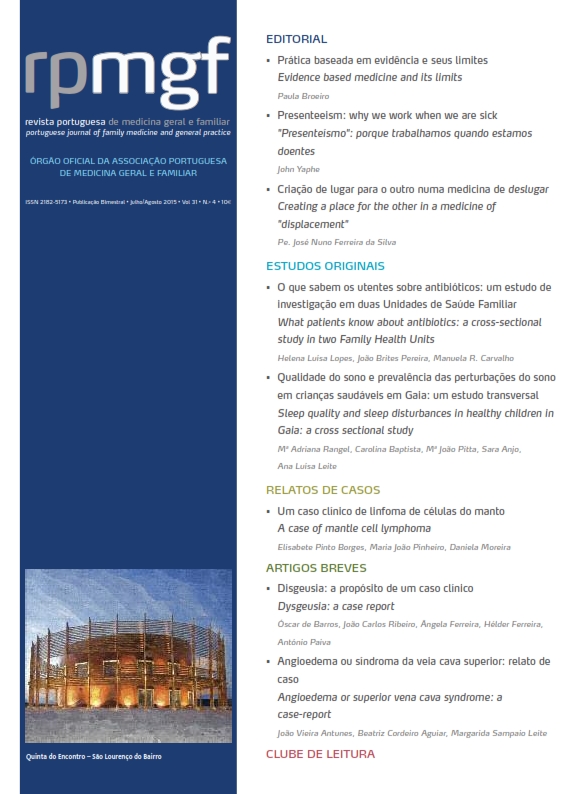Dysgeusia: a case report
DOI:
https://doi.org/10.32385/rpmgf.v31i4.11555Keywords:
Dysgeusia, Taste, TonsillectomyAbstract
Introduction: The distortion of the sense of taste (dysgeusia), transient or permanent, may have significant impact on the lives of patients. It may be associated with weight loss, anorexia, malnutrition, depressive symptoms, and a significant reduction in quality of life. Dysgeusia can have several causes. One surgical cause is tonsillectomy. Case description: A 38 year-old female patient, with dysgeusia is presented. She had a history of bilateral chronic tonsillitis and a cold blade tonsillectomy was performed with electrocautery of tonsillar hemorrhages without complications. After surgery she complained of dysgeusia characterized by lack of taste discrimination, stating that all foods seemed bitter. Six months after surgery, at a follow-up consultation, her gustatory function was evaluated with taste strips. This revealed changes in taste discrimination. She experienced a bitter taste, even when stimulated with sour, sweet or salty stimuli. The patient began daily gustatory rehabilitation, working on mental associations with sensory stimuli. She repeated the gustometry one year after surgery. The patient improved, although selective dysgeusia persisted with a bitter sensation in the presence of salt at low concentration. Comment: Dysgeusia is a rare complication of tonsillectomy, but can have great impact on the lives of patients. The surgical procedure can damage sensory nerves responsible for taste, directly or indirectly. There are few therapeutic options. Cases are under reported in the literature, and tend to be benign. Dysgeusia can have various causes, such as antihypertensive drugs, poor oral hygiene, surgery, infection, smoking, diabetes, autoimmune diseases, anti-microbial agents, and anti-inflammatory drugs. In primary health care, taste complaints often have no obvious explanation at the initial presentation. In Portugal there is no data on their incidence. It is important to sensitize clinicians to this disease. Patients’ complaints about changes in taste should be addressed because of the impact that it has on the quality of life and possible treatable causes. Patients with dysgeusia require assessment, advice and treatment.Downloads
Downloads
Published
Issue
Section
License
The authors will assign to the RPMGF the sole right to publish and distribute the content of the manuscript specified in this declaration via physical, electronic, broadcasting or any other medium that may come into existence. They also grant the RPMGF the right to use and exploit this manuscript, in particular by assigning, selling or licensing its content. This permission is permanent and takes effect from the moment the manuscript is submitted, has the maximum duration allowed by applicable Portuguese or international law and is of worldwide scope. The authors further declare that this assignment is made free of charge. If the RPMGF informs the authors that it is not going to publish their manuscript, the exclusive assignment of rights ceases forthwith.
The authors authorise the RPMGF (or any entity it may appoint) to act on their behalf when it believes that copyright may have been infringed.





